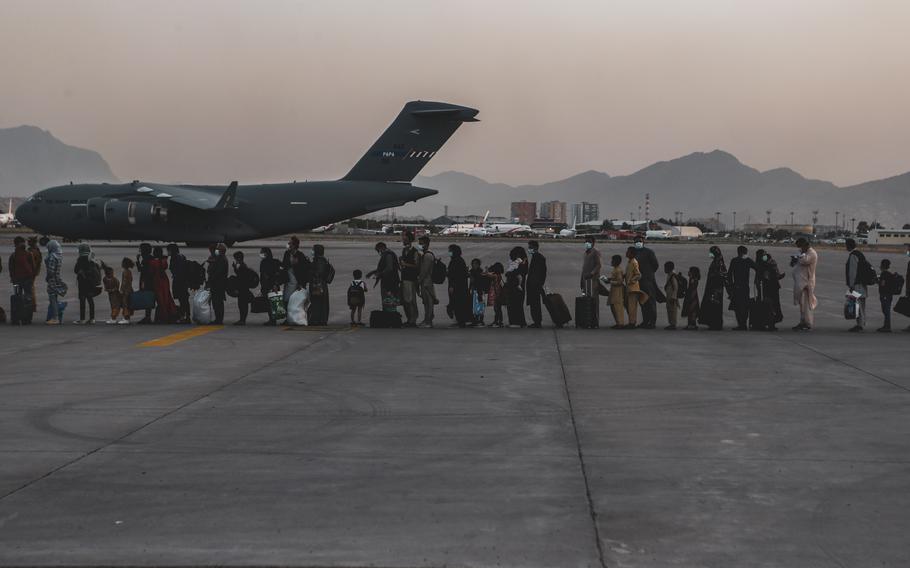ST. LOUIS (Tribune News Service) — Haseeb Ahmadi has a database of 100 names. It's full of the details and minutiae needed for a person who grew up in Afghanistan to get a visa for the United States.
The names on Ahmadi's list have all been approved for Special Immigrant Visas. They were contractors who, like Ahmadi, served as interpreters for the American military during the long slog of war in Afghanistan.
That database, says Pete Lucier, is pure gold.
Two years ago, after the fall of Kabul, Hugh Tychsen got a copy of that database to Lucier. Tychsen and Lucier both served as Marines in Afghanistan. Ahmadi was Tychsen's interpreter. Tychsen sponsored Ahmadi's visa and helped him settle in St. Louis in 2017.
It's really hard to navigate the broken American immigration system, even when the country establishes that getting Afghan interpreters to U.S. shores is a priority. But together, the three men have figured out how to do it.
Lucier works with a nonprofit called Team America, which helps Afghans with approved visas to get on flights out of Kabul. The former interpreters and their families often head to other countries before they come to the U.S. The quality of the database created by Ahmadi and Tychsen puts their families at the top of the list.
Still, it's been two years, and less than half of the people on the list have made it out of Afghanistan. Those left behind live in the shadows, in squalor, unable to work to support their families. They are in constant fear, hiding from the Taliban.
"People are starving," Ahmadi says. "People are sick. It makes me cry every day."
Two recent movies, "The Covenant" and " Kandahar," have drawn renewed attention to the critical help Afghan interpreters offered the U.S. and efforts to get them out of the country.
There are success stories. Ahmadi is one of them. Since coming here in 2017, the 34-year-old has been joined by his wife and daughter. He and his wife have had a second daughter since.
Ahmadi became an American citizen. He started a construction business. About 20 men on Ahmadi's list have made it to St. Louis. Counting their family members, that's about 85 people who have arrived.
Some of the folks pool their money and, in a cloak-and-dagger routine, use What's App, Signal and other encrypted messaging platforms to get money back to their loved ones — who are still waiting to get on one of those flights for freedom.
"We need more flights," says Lucier.
He's also working with other veterans to push for passage of the Afghan Adjustment Act, which would help those who have secured visas, or escaped in some way, to find a clear path to citizenship and avoid getting bogged down in more paperwork.
Working through that paperwork is what dominates Ahmadi's time when he isn't running his business or raising a family. He emails the government daily on behalf of colleagues he's trying to bring to St. Louis, often sending the documents he knows will eventually be asked for.
"It's like you're dealing with the DMV, but you're doing everything through email and they don't respond for 90 days," Tychsen says.
But persistence is the name of the game. And with success comes a new life in America. For those Afghans who don't have family in other places, Ahmadi urges them to come to St. Louis, where the rents are relatively inexpensive and the opportunity is as big as one's imagination.
That's in part, Tychsen says, because local businesses and nonprofits have put out the welcome mat. They range from the International Institute, to Oasis International, to the city's Office of New Americans. Business leaders, meanwhile, are urging companies to hire Afghans.
Since August 2021, St. Louis has welcomed more than 1,300 Afghan refugees. Earlier this year, the Afghan Chamber of Commerce was launched. There is a digital Afghan newspaper published in English, Dari and Pashto.
"There's this growing sense of bipartisan support that immigrants and refugees are key to achieving the economic prosperity that our region needs to be successful in the future," says Jason Hall, CEO of the business group Greater St. Louis. "International migration to St. Louis is the bright spot in our growth. There is a lot of passion around the issue among our members."
Ahmadi has enough passion to fill St. Louis three times over. He applies it every day, earning money to keep other Afghans alive long enough to find new opportunity in a city he and his family now call home.
"If they don't get out of Kabul, they die," Ahmadi says. "I am praying for just one more family to make it out."
And then one more after that. And another one. Until a life-saving database has no more names.
To learn more or support the effort to bring refugees to St. Louis, go to: https://stlgives.org/st-louis-welcome-fund-created-to-support-refugees/.
(c)2023 the St. Louis Post-Dispatch
Visit at www.stltoday.com
Distributed by Tribune Content Agency, LLC.

Evacuees wait to board a Boeing C-17 Globemaster III during an evacuation at Hamid Karzai International Airport, Kabul, Afghanistan, Aug. 23, 2021. U.S. service members are assisting the Department of State with a Non-combatant Evacuation Operation (NEO) in Afghanistan. (Isaiah Campbell/U.S. Marine Corps)